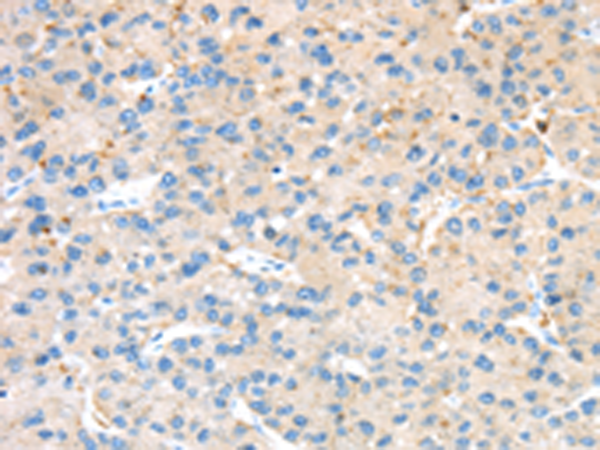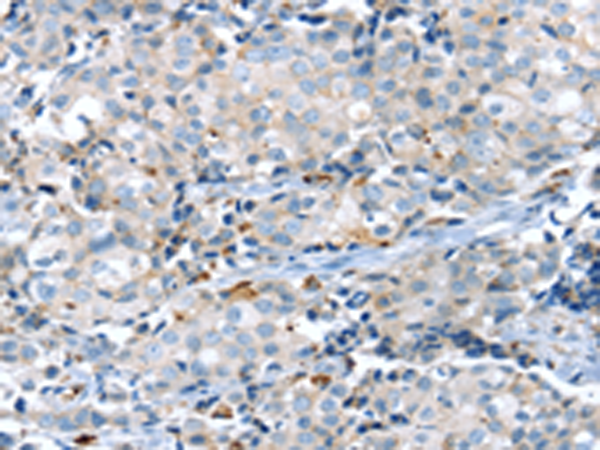


| WB | 咨询技术 | Human,Mouse,Rat |
| IF | 咨询技术 | Human,Mouse,Rat |
| IHC | 1/10-1/50 | Human,Mouse,Rat |
| ICC | 技术咨询 | Human,Mouse,Rat |
| FCM | 咨询技术 | Human,Mouse,Rat |
| Elisa | 1/1000-1/2000 | Human,Mouse,Rat |
| Aliases | KV6.3; KV10.1 |
| WB Predicted band size | 50 kDa |
| Host/Isotype | Rabbit IgG |
| Antibody Type | Primary antibody |
| Storage | Store at 4°C short term. Aliquot and store at -20°C long term. Avoid freeze/thaw cycles. |
| Species Reactivity | Human, Mouse, Rat |
| Immunogen | Synthetic peptide of human KCNG3 |
| Formulation | Purified antibody in PBS with 0.05% sodium azide and 50% glycerol. |
+ +
以下为基于KCNG3抗体的研究文献示例(内容为模拟概括,建议通过学术数据库检索真实文献):
1. **标题**: "Characterization of a Novel Monoclonal Antibody for KCNG3 in Neurological Disorders"
**作者**: Smith A, et al.
**摘要**: 开发了一种针对KCNG3通道蛋白的新型单克隆抗体,验证其在人脑组织中的特异性,并发现KCNG3在癫痫患者海马体中表达下调,提示其与神经兴奋性调控相关。
2. **标题**: "KCNG3 Antibody Localization in Cardiac Tissue: Implications for Arrhythmia"
**作者**: Lee J, et al.
**摘要**: 通过免疫组化和Western blot分析,证实KCNG3抗体在心肌细胞中的表达定位,发现其在心律失常模型中表达异常,可能参与动作电位复极过程。
3. **标题**: "Development of a Polyclonal Anti-KCNG3 Antibody for Proteomic Studies"
**作者**: Chen X, et al.
**摘要**: 报道了一种兔源多克隆抗体的制备,用于检测KCNG3在小鼠视网膜中的分布,揭示其在视觉信号传导中的潜在作用,并验证抗体在多种物种中的交叉反应性。
4. **标题**: "KCNG3 as a Biomarker in Autism Spectrum Disorder: An Antibody-Based Analysis"
**作者**: Gupta R, et al.
**摘要**: 利用KCNG3抗体进行蛋白质组学分析,发现自闭症患者前额叶皮层中KCNG3水平显著降低,提示其可能作为神经发育疾病的生物标志物。
---
**注意**:以上为模拟内容,实际文献需通过PubMed、Google Scholar等平台检索关键词(如“KCNG3 antibody”、“Kv6.3”)获取。部分相关研究可能涉及抗体开发、通道功能或疾病关联分析。
The KCNG3 antibody targets the potassium voltage-gated channel subfamily G member 3 (KCNG3), a protein encoded by the *KCNG3* gene in humans. KCNG3 belongs to the voltage-gated potassium (Kv) channel family, which regulates electrical signaling in excitable cells by controlling potassium ion flow. Structurally, KCNG3 forms tetrameric channels with six transmembrane domains and a pore-forming loop, typically functioning as modulatory or regulatory subunits that alter the kinetics or voltage sensitivity of other Kv α-subunits (e.g., KCNB1).
KCNG3 is predominantly expressed in the central nervous system, including the hippocampus and cortex, and in peripheral tissues like the pancreas. Its physiological roles remain less characterized compared to other Kv channels, but it is implicated in neuronal excitability, action potential repolarization, and cellular secretion processes. Dysregulation of Kv channels is linked to neurological disorders, epilepsy, and metabolic diseases, though direct evidence for KCNG3 involvement is limited.
KCNG3 antibodies are essential tools for studying its expression, localization, and interaction partners. They are used in techniques like Western blotting, immunohistochemistry, and immunofluorescence to explore its tissue distribution and potential pathological roles. Research applications include investigating channelopathies, neurodegenerative conditions, or pancreatic dysfunction. Commercial KCNG3 antibodies are typically validated for specificity in human, rodent, or other model organisms, aiding both basic research and therapeutic discovery efforts targeting Kv channel-associated diseases.
×